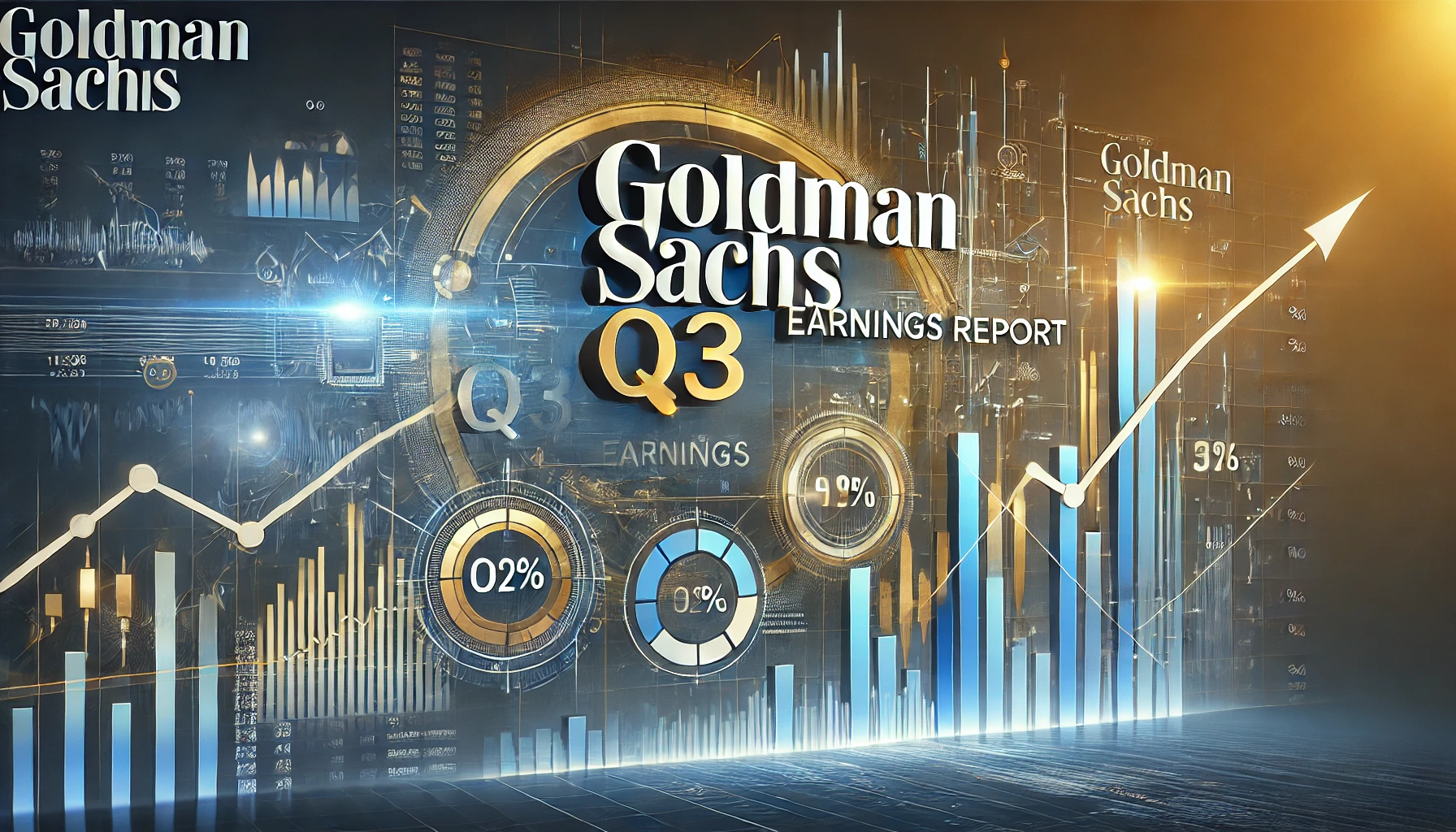Goldman Sachs Q3 Earnings Report: Key Takeaways and Financial Highlights
As Goldman Sachs prepares to release its Q3 earnings report, investors and analysts alike are eager to see how the financial giant has performed during this critical quarter. With the company’s stock performance and overall financial health under close scrutiny, the Goldman Sachs earnings report will provide key insights into the bank’s profitability, growth prospects, and future strategy. This blog will break down the important highlights of the Q3 earnings, analyze how it impacts the company’s stock, and discuss broader trends within the investment banking sector.
In this article, we’ll cover the details of Goldman Sachs’ Q3 earnings, explore its revenue and financial performance, and provide insights into what these earnings mean for the company’s stock price. For investors looking to make informed decisions, this guide offers a comprehensive overview of what to expect from Goldman Sachs in the near future.
Goldman Sachs Q3 Earnings: What to Expect?
Goldman Sachs is set to report its third-quarter earnings in 2024, and analysts are predicting strong financial results driven by several key factors. The Goldman Sachs earnings report will shed light on how the company has navigated through challenging market conditions, including inflationary pressures, geopolitical uncertainties, and fluctuating market demand.
Key Drivers of Goldman Sachs’ Q3 Performance
Several factors are expected to play a significant role in shaping Goldman Sachs’ Q3 earnings:
- Investment Banking: As one of the world’s leading investment banks, Goldman Sachs continues to generate significant revenue from its advisory services, including mergers and acquisitions, underwriting, and capital raising activities. Investment banking has been a strong revenue driver for the company, and analysts expect it to remain a critical component of its Q3 earnings.
- Asset Management: Goldman Sachs’ asset management division has been a key source of growth, providing steady revenue from managing portfolios for high-net-worth individuals, institutional clients, and sovereign wealth funds. The Goldman Sachs Q3 earnings report is expected to reflect strong performance in this area, thanks to market recovery and investor confidence.
- Trading and Securities: The volatility in global financial markets has created opportunities for Goldman Sachs to capitalize on trading activities. The bank’s strong presence in the equities and fixed-income markets may bolster its Q3 earnings, as increased market activity has likely driven trading volumes higher.
How the Earnings Report Impacts Investors
For investors, the Goldman Sachs earnings report will be a critical indicator of the company’s financial health. Investors will be paying close attention to revenue growth, profit margins, and any guidance provided for the upcoming quarter. A strong earnings report could signal confidence in the bank’s future performance, which may drive up Goldman Sachs stock and further strengthen its market position.
Goldman Sachs Stock Performance: How Will Q3 Earnings Impact Stock Price?
The performance of Goldman Sachs stock is closely tied to the company’s financial results, and the Q3 earnings are expected to have a significant impact on the bank’s stock price. Historically, earnings reports have led to fluctuations in stock prices, especially when results exceed or fall short of analyst expectations.
Goldman Sachs Stock Price: What Investors Need to Know
As the release date for the Goldman Sachs Q3 earnings approaches, Goldman Sachs stock price has seen fluctuations as investors speculate on the company’s financial performance. In the days leading up to the earnings call, many investors are positioning themselves based on anticipated results.
If the earnings report reveals stronger-than-expected profits, Goldman Sachs stock price may surge as investors gain confidence in the bank’s growth potential. However, weaker-than-expected results could trigger a sell-off, driving the stock price down. In either case, it’s essential for investors to stay informed about the bank’s financial performance and broader market trends.
Historical Stock Performance Around Earnings Reports
Historically, Goldman Sachs stock tends to experience increased volatility around earnings season. For instance, in past quarters, the bank’s stock has seen significant price movements immediately following the release of its quarterly earnings report. For long-term investors, understanding these patterns can help make informed decisions about when to buy or sell Goldman Sachs stock.
Goldman Sachs Financials and Revenue: A Look at Q3 Results
One of the key components of the Goldman Sachs Q3 earnings report will be the company’s financials and revenue growth. Investors are particularly interested in seeing how Goldman Sachs’ revenue has evolved in the third quarter, as this provides a snapshot of the bank’s overall financial health.
Key Financial Metrics to Watch in Q3
Several financial metrics will be closely watched in the upcoming earnings report, including:
- Revenue Growth: Analysts are looking for solid revenue growth in Goldman Sachs’ core business units, including investment banking, asset management, and trading. A strong showing here will reinforce investor confidence and support the bank’s stock price.
- Profit Margins: Profit margins will be an important metric for assessing how efficiently the bank is operating. Higher margins indicate that Goldman Sachs is managing its costs effectively, which is a positive sign for investors.
- Net Income: The Goldman Sachs earnings report will also reveal the company’s net income for the quarter. A significant increase in net income would signal that the bank’s revenue growth is translating into profitability.
Revenue from Key Business Segments
Goldman Sachs generates revenue from several core business segments, including:
- Investment Banking: As mentioned earlier, this segment has historically been a strong contributor to Goldman Sachs revenue. Analysts expect continued strength in advisory services and capital markets activities.
- Global Markets: Trading activity is expected to remain robust in Q3, with Goldman Sachs benefiting from increased market volatility. This segment is particularly important for the bank’s overall revenue growth.
- Asset Management: This division is expected to deliver solid results, as rising asset prices and increased client inflows drive growth in managed assets.
Goldman Sachs Earnings Call: Key Insights and Takeaways
In addition to the earnings report, investors will be closely watching the Goldman Sachs earnings call, where the bank’s executives will provide insights into the company’s performance and offer guidance for the coming quarters. The earnings call is an opportunity for management to discuss the factors driving the company’s financial results and to address any concerns raised by analysts.
What to Expect from the Earnings Call
During the Goldman Sachs earnings call, investors can expect management to discuss several key topics:
- Outlook for the Next Quarter: Management will likely provide guidance on what to expect in Q4 and beyond. This could include expectations for revenue growth, potential challenges, and the company’s overall strategy.
- Capital Allocation: Investors will be keen to hear how Goldman Sachs plans to allocate capital moving forward. This could include discussions on dividends, share buybacks, and investments in growth areas like technology and sustainability.
- Economic Outlook: Given Goldman Sachs’ role as a major player in the global financial system, investors will be interested in the bank’s views on macroeconomic trends, including interest rates, inflation, and geopolitical risks.
Investment Bank Earnings: How Goldman Sachs Compares to Its Peers
While Goldman Sachs earnings are a significant indicator of the company’s performance, it’s also important to consider how the bank’s results stack up against other investment banks. The broader investment bank earnings landscape can provide context for Goldman Sachs’ performance, offering insights into industry trends and challenges.
Comparing Goldman Sachs to Other Investment Banks
In Q3 2024, major investment banks like JPMorgan Chase, Morgan Stanley, and Citigroup are also releasing their earnings reports. By comparing Goldman Sachs’ results with its peers, investors can assess how the bank is performing relative to the broader industry.
- JPMorgan Chase: Known for its strong retail and commercial banking divisions, JPMorgan is expected to deliver robust earnings in Q3. Comparisons with Goldman Sachs will likely focus on the investment banking and trading divisions.
- Morgan Stanley: With a strong presence in wealth management, Morgan Stanley’s Q3 results will provide insights into how well the wealth management and asset management segments are performing compared to Goldman Sachs.
- Citigroup: Citigroup’s earnings will offer a broader perspective on global market trends, as the bank has a larger international presence. Investors may compare how Goldman Sachs’ international operations performed relative to Citigroup.
What to Expect from Goldman Sachs Q3 Earnings and Stock Performance
As Goldman Sachs prepares to release its Q3 earnings report, investors should be paying close attention to several key metrics, including Goldman Sachs’ revenue, profit margins, and stock performance. The Goldman Sachs earnings call will provide additional insights into the bank’s strategy and outlook for the future. For those invested in Goldman Sachs stock, this earnings report will be a critical moment to assess the bank’s financial health and future growth prospects.
Whether you’re a long-term investor or someone following the financial sector closely, the upcoming Goldman Sachs Q3 earnings report is sure to provide important takeaways. For more insights into financial markets and investment strategies, be sure to explore additional resources from Regent Studies, where you’ll find in-depth analysis on major market trends.



